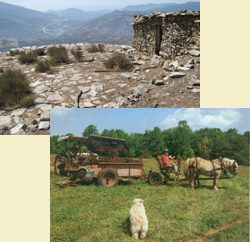« Biochar – a Critical View Through the Ecosystemic Lens | Home | What is Sustainable? »
How the Maximum Power Principle affects living systems
By Karl North | November 22, 2017
I make no claim to expertise on the subject, but here is how I understand it. The laws of thermodynamics are central for understanding how the universe operates. One of the aspects of the second law is that gradients of energy or matter will try to eliminate themselves. This is important because of all the consequences – the many dynamics it explains. In the process of draining energy gradients, many structures are created: inanimate ones like mountain ranges and weather, living systems and their organisms, and social structures and their material elements including the industrial civilization made possible by fossil fuels. This process follows a Maximum Power Principle (MPP, explained below). Systems ecologist Howard T. Odum in his book, Environment, Power, and Society for the Twenty-first Century: The Hierarchy of Energy made a landmark contribution to general systems theory. He created a framework for understanding behavior in all systems based on how energy works. Because of the important influence of MPP on the dynamic behavior of all systems in the known universe, Odum proposed MPP as a fourth law of thermodynamics .
As Odum describes it, under the influence of MPP “systems that prevail are those with loading adjusted to operate at the peak of the power efficiency curve”. This helps explain all sorts of structures in the universe, from microscopic to astronomic. Odum elaborates, “The natural processes of design selection during self-organization cause the systems to develop that maximize power intake and useful consumption. In each energy transformation an optimal intermediate efficiency is selected that maximizes power.” In other words, the more energy available, the more it will tend be used to the maximum in accord with MPP. For living systems, following Lotka, he says that this assumes a Darwinian selection is occurring in this direction in the long run. Hence, in compliance with MPP, all species will try to multiply their populations to fill the available carrying capacity of the system, as delimited by the available energy. The human species, for example, under the influence of MPP, and accessing apparently unlimited fossil fuel, goes on a predictable consumption binge, drawing down energy and all finite natural resources on earth. The resulting population overshoot and its resource consumption erodes the earth’s carrying capacity causing human population to collapse.
There is debate about the influence of MPP on the behavior of human society. The dominant influence of MPP on all species has fostered a genetic deterministic reading of MPP regarding humanity such that overshoot in the fossil fuel era was inevitable, and will always occur if not constrained by natural energy limits. I am not so sure. Overall, human historical and even prehistorical experience certainly follows MPP, but the existence of attempts at moderation, however small, suggests that other genetic traits exist that allow other choices. So I tend to see MPP as a strong force among others that might prevail under different social and cultural conditions. Among the conditions is the type of social organization chosen. For example, Cuba is the only nation in Latin America where policy choices are causing forest area to increase. In all the others, deforestation is the historical pattern. According to a deterministic reading, MPP should overrule Cuban policy choices, and human society everywhere will maximize deforestation to maximize its consumption of its stored energy content, as every society has done in the ten thousand years of ‘civilization’. The Cuban example is just one of many societal choices in human history that are exceptions to MPP as an overriding rule. So it appears that a diversity of choices is found in the human genetics evolved to date, of which the MPP factor is only one, albeit a very strong one. Notably, this diversity in our genetic heritage and in all species is critical to survival: according to evolutionary theory it is necessary to allow adaptation and evolution to occur.
Topics: Political and Economic Organization, Social Futures, Peak Oil, Relocalization, Uncategorized | No Comments »
